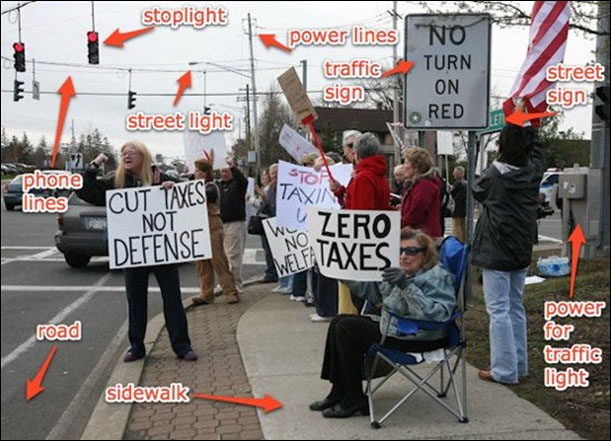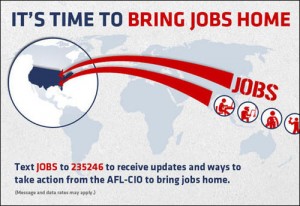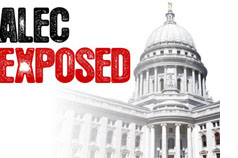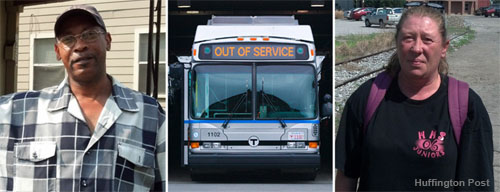NEWS ROUNDUP
Your low taxes, let ’em die, abandon ALEC, transit trap…
Wednesday, July 11, 2012
TAXES
 ► In today’s Washington Post — In 2009, Americans paid lowest tax rates in 30 years to federal government — At the very moment anti-tax protesters were emerging as the most powerful force in American politics, handing Republicans landslide control of the U.S. House, the data show that people were sending the smallest portion of their income to the federal government since 1979.
► In today’s Washington Post — In 2009, Americans paid lowest tax rates in 30 years to federal government — At the very moment anti-tax protesters were emerging as the most powerful force in American politics, handing Republicans landslide control of the U.S. House, the data show that people were sending the smallest portion of their income to the federal government since 1979.
► In today’s NY Times — Mitt Romney’s financial black hole (editorial) — Mitt Romney’s lack of full disclosure of his finances keeps voters from seeing the breadth of his tax avoidance.
► At Huffington Post — GOP Sen. Graham: ‘It’s really American’ to avoid taxes like Romney does— Romney shouldn’t be criticized for using offshore tax havens because “it’s really American to avoid paying taxes, legally,” said Sen. Lindsey Graham (R-S.C.)
HEALTH CARE
► At TPM — GOP holds 33rd vote to stick it to ‘Obamacare’ — With less than four months until Election Day, the meaningless show vote is easy for Republicans and Democrats who are dug in to their positions, but it’s uncomfortable for members in tough races.
 ► In today’s Washington Post — GOP to uninsured: Drop dead (by Matt Miller) — The party may not have officially adopted the “let ’em die” policy of right-wing hecklers at that CNN primary debate, when Ron Paul was asked what should be done when uninsured folks show up at the hospital. But as a practical matter, Republicans are in pretty unsavory territory. What other conclusion can we draw when Rick Perry, who presides over a state where fully one in four people lack health coverage, makes swaggering indifference to these Texans’ plight a point of sovereign pride?
► In today’s Washington Post — GOP to uninsured: Drop dead (by Matt Miller) — The party may not have officially adopted the “let ’em die” policy of right-wing hecklers at that CNN primary debate, when Ron Paul was asked what should be done when uninsured folks show up at the hospital. But as a practical matter, Republicans are in pretty unsavory territory. What other conclusion can we draw when Rick Perry, who presides over a state where fully one in four people lack health coverage, makes swaggering indifference to these Texans’ plight a point of sovereign pride?
► At The Hill — Sebelius urges states to accept health law’s Medicaid expansion — The day after the Supreme Court announced its decision upholding the healthcare law, HHS rolled out new funding opportunities designed to jump-start implementation even in states that had resisted any planning work.
ELECTION
 ► At AFL-CIO Now — Wall Street Journal compares union political spending to corporate donations — The right wing is excited about a new Wall Street Journal article purporting union spending on politics is far greater than known and is as big a factor as excessive corporate money in politics. The Wall Street Journal treats all advocacy for working people at the local, state and federal levels as “political” work. Everything from someone writing policy proposals to create jobs to working in a local community to elect a working families-friendly City Council is viewed as equivalent to corporations anonymously attacking President Obama.
► At AFL-CIO Now — Wall Street Journal compares union political spending to corporate donations — The right wing is excited about a new Wall Street Journal article purporting union spending on politics is far greater than known and is as big a factor as excessive corporate money in politics. The Wall Street Journal treats all advocacy for working people at the local, state and federal levels as “political” work. Everything from someone writing policy proposals to create jobs to working in a local community to elect a working families-friendly City Council is viewed as equivalent to corporations anonymously attacking President Obama.
► At Slog — Republican Pflug trashes Rossi, endorses Democrat — If you thought yesterday’s appointment of professional loser Dino Rossi to fill the remaining four months of Cheryl Pflug’s 5th LD state senate term was nothing more than a formality, then you’re obviously not Cheryl Pflug. “I’m angry and appalled at the tactics of my former Senate Republican leadership,” an appalled Pflug angrily wrote in a press release issued today, “and I think they and Rossi shame themselves by trying to play Godfather.”
LOCAL
 ► At MyNorthwest.com — Former factory workers: Talk is cheap — “I want to believe that (politicians are) really going to do something,” said Darrell Moffett, a former Kimberly-Clark factory worker, who lost his job when the company closed its Everett site earlier this year. Workers gathered outside the plant Monday in support of the Bring Jobs Home Act, which would offer tax incentives for companies who bring jobs back to the United States.
► At MyNorthwest.com — Former factory workers: Talk is cheap — “I want to believe that (politicians are) really going to do something,” said Darrell Moffett, a former Kimberly-Clark factory worker, who lost his job when the company closed its Everett site earlier this year. Workers gathered outside the plant Monday in support of the Bring Jobs Home Act, which would offer tax incentives for companies who bring jobs back to the United States.
ALSO at The Stand — Congress urged to pass Bring Jobs Home Act — See the video coverage of Darrell Moffett and other former K-C workers at Monday’s Bring Jobs Home event.
► In today’s Columbian — C-Tran puts light rail measure to voters — The C-Tran Board finalizes plans for a Nov. 6 sales tax ballot measure that would, in part, pay for the operation of a light rail extension into Vancouver, planned as part of the Columbia River Crossing project. It would also help fund a proposed bus rapid transit line on the city’s Fourth Plain corridor
► In today’s Columbian — Vancouver port awards rail contract — Commissioners approve a $2.5 million contract to begin work on building a new rail access route into the port. The project, to begin in August, will rid the region of a traffic chokepoint and boost the movement of both freight and passenger train traffic.
BOEING
► In today’s Seattle Times — Boeing exec: 787s will begin to flow this quarter; room for future work like 777X will open up — Pat Shanahan, senior vice president of Airplane Programs for Boeing Commercial Airplanes, said Tuesday that the company has “a lot of flexibility” to accommodate increased production and future work at its Everett site without any extensive new buildings.
NATIONAL
 ► At AFL-CIO Now — More major corporations dump ALEC memberships — Five more major corporations severed their ties with the extremist American Legislative Council. Their exit brings the number of big corporations to 25 — plus four major non-profit groups and 55 lawmakers — that have recently left ALEC and its agenda of voter suppression, union-busting and immigrant bashing. The five latest companies, according to Reuters, are Hewlett-Packard, CVS Caremark, Deere & Co., MillerCoors and Best Buy.
► At AFL-CIO Now — More major corporations dump ALEC memberships — Five more major corporations severed their ties with the extremist American Legislative Council. Their exit brings the number of big corporations to 25 — plus four major non-profit groups and 55 lawmakers — that have recently left ALEC and its agenda of voter suppression, union-busting and immigrant bashing. The five latest companies, according to Reuters, are Hewlett-Packard, CVS Caremark, Deere & Co., MillerCoors and Best Buy.
► In today’s NY Times — Unions fight Scranton mayor after he cuts pay to minimum wage — When the city of Scranton, Pa., found itself down to its last $5,000 in the bank last week, its Democratic mayor took a highly unusual step: he unilaterally cut the pay of city workers — including police officers, firefighters and even himself — to the minimum wage, just $7.25 an hour. Now the city’s unions are fighting for their promised pay in court.
► In today’s NY Times — The spreading scourge of corporate corruption (by Eduardo Porter) — The misconduct of the financial industry no longer surprises most Americans, and trust in big business overall is declining. We should be alarmed.
TODAY’S MUST-READ
► At Huffington Post — The Transit Trap: Unemployment problem includes public transportation that separates poor from jobs — A formidable barrier separates millions of poor Americans from the working world, particularly as work continues to shift to the suburbs: Limited public transportation networks reduce the ability of those who need work to actually find it, worsening an already bleak job market. On top of the most catastrophic economic downturn since the Great Depression, the continued impact of automation, and the shift of domestic production to lower-wage nations, here is a less dramatic yet no less decisive constraint that limits opportunities for many working-age Americans: The bus does not go where the paychecks are.
The Stand posts links to Washington state and national news of interest every weekday morning by 9 a.m.






